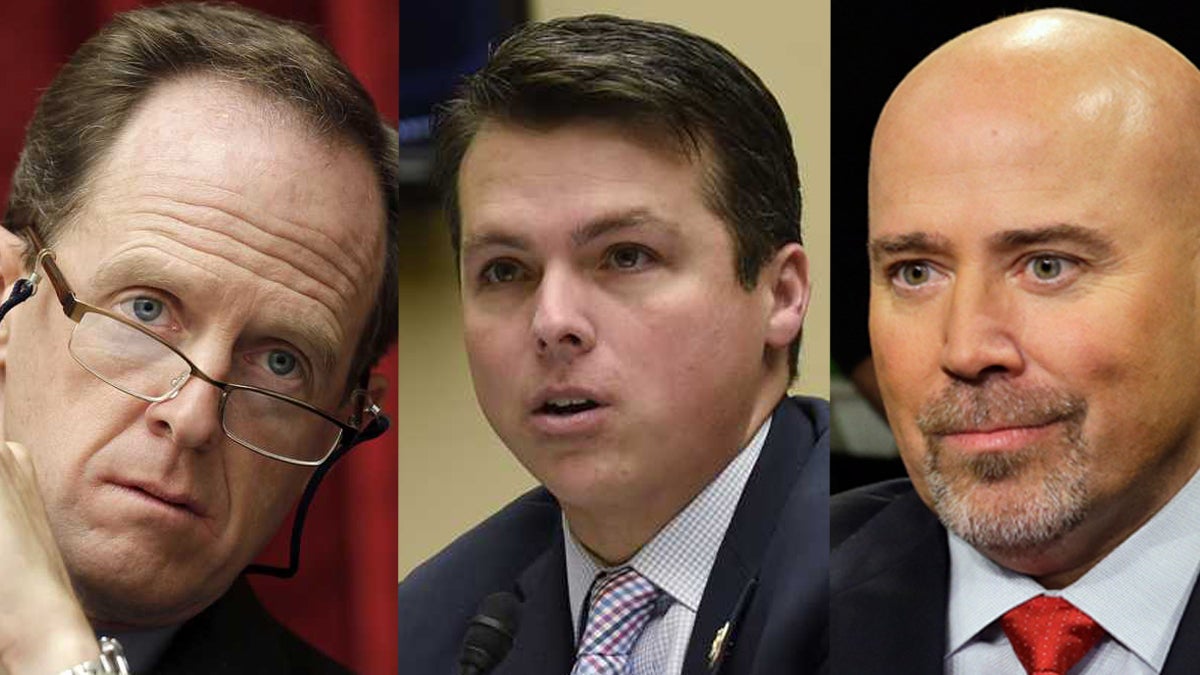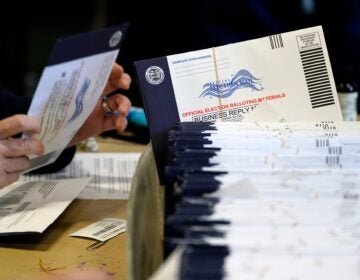Congressional delegation from Pa., N.J. gives Trump budget mixed reviews
Listen
(From left) U.S. Sen. Pat Toomey, R-Pennsylvania; U.S. Rep. Brendan Boyle, D-Pennsylvania; and Republican U.S. Rep. Tom MacArthur of New Jersey react to President Donal Trump's budget plan. (AP photos)
President Donald Trump is proposing massive cuts to Medicaid, Meals on Wheels and other “safety net” programs in order to pay for a defense buildup, while also cutting the deficit.
The spending plan calls for slashing the Environmental Protection Agency’s budget by 30 percent and reducing funds to the Department of Housing and Urban Development by 12 percent.
So how is that playing among senators and representatives from our region? U.S. Rep. Leonard Lance of central New Jersey offered a typical Republican response to the plan.
“There are parts of it that I like, and there are parts of it I don’t like,” Lance said. “I like the fact that it balances in 10 years, which I don’t think ever happened in the Obama era.”
But that projection of a balanced budget over a decade has been rejected by many economists, because it relies on the projection of 3 percent economic growth over that time. That, they say, is impossible to know.
“I hope we can get to 3 percent economic growth,” Lance said.
Republican U.S. Sen. Pat Toomey of Pennsylvania, who serves on the Senate Budget Committee, said the projections make sense because he’s counting on a GOP overhaul of the tax code.
“I think it’s just dramatically wrong to not take account of the dynamic effect of more growth on federal revenue,” said Toomey. “If the economy is larger, there is that much more to tax, therefore more revenue.”
Trump’s budget also proposes cutting Medicaid by as much as $1.4 trillion —though exact numbers are hard to pin down. Experts said that could set back the effort to stem the opioid crisis because the program pays for 30 percent of drug treatment nationwide.
But Toomey argued the proposed cuts to the nation’s safety net programs are acceptable if the GOP can accomplish major tax changes.
“If you have stronger economic growth, you’re going to have reductions in various welfare payments because fewer people will need those welfare payments. That should be the purpose,” Toomey said. “That should be the whole idea — diminishing numbers of people on Medicaid and food stamps and Section 8 housing, because they’re able to get work that pays enough for them to support themselves and their families.”
The Democratic response
Democrats aren’t buying that logic. By proposing such massive cuts to safety net programs, the president is betraying many Pennsylvania voters who helped propel him into the Oval Office, said U.S. Rep. Brendan Boyle of Philadelphia.
“Trump won the presidency, essentially, campaigning as not a conventional Republican. He came to Pennsylvania, came to other traditionally Democratic states, talked about investing in our nation’s infrastructure, said that he wouldn’t cut Social Security, wouldn’t cut Medicare and Medicaid, and here he has a budget that would bring with it some of the biggest cuts in America’s history,” Boyle said.
And there’s something else that troubles him about the budget proposal.
“Some of the biggest tax cuts are for the hyper-wealthy — not just the wealthiest 1 percent,” Boyle said. “I mean, we’re talking about the 0.01 percent. They would be getting massive tax cuts at the same time you’re pushing through the deepest cuts to Medicaid and the social safety net.”
Another part of the budget worries even Republicans from the region — it would spend less on updating flood-zone maps. And with sea levels rising, U.S. Rep. Tom MacArthur and other New Jersey lawmakers are wondering why.
“I think cutting mapping is shortsighted,” MacArthur said. “The mapping is already inadequate and we need to invest in that for the safety of 140 million Americans who live in coastal counties. This isn’t a issue for a small group of Americans. Forty percent of the country lives in counties that are on the ocean, and we need to get the maps right.”
Lawmakers in both parties are now in the driver’s seat when it comes to writing the actual budget. The president will have leverage if he’s willing to use is his veto pen.
Republicans controlling the House, Senate and White House want to make sure they strike a deal and avoid a government shutdown.
WHYY is your source for fact-based, in-depth journalism and information. As a nonprofit organization, we rely on financial support from readers like you. Please give today.




